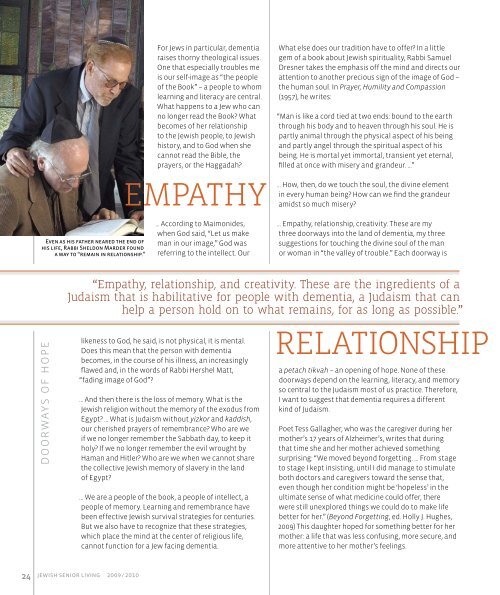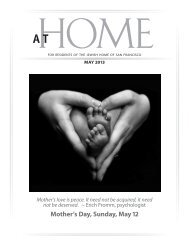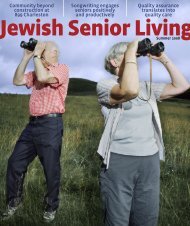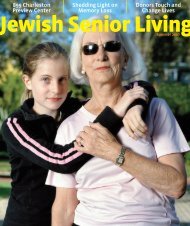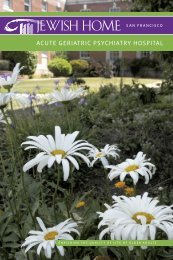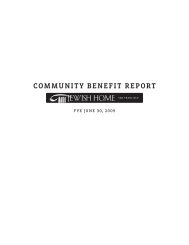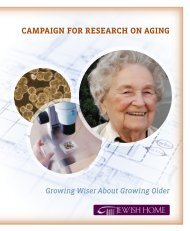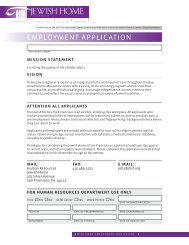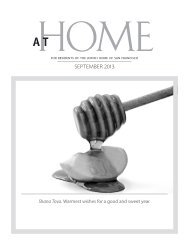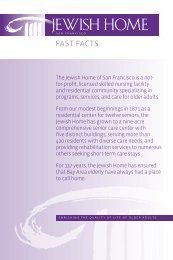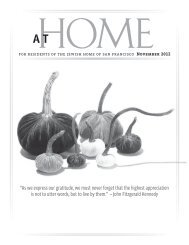UCSF and the Jewish Home partner for research A world of interests ...
UCSF and the Jewish Home partner for research A world of interests ...
UCSF and the Jewish Home partner for research A world of interests ...
You also want an ePaper? Increase the reach of your titles
YUMPU automatically turns print PDFs into web optimized ePapers that Google loves.
For Jews in particular, dementia<br />
raises thorny <strong>the</strong>ological issues.<br />
One that especially troubles me<br />
is our self-image as “<strong>the</strong> people<br />
<strong>of</strong> <strong>the</strong> Book” – a people to whom<br />
learning <strong>and</strong> literacy are central.<br />
What happens to a Jew who can<br />
no longer read <strong>the</strong> Book? What<br />
becomes <strong>of</strong> her relationship<br />
to <strong>the</strong> <strong>Jewish</strong> people, to <strong>Jewish</strong><br />
history, <strong>and</strong> to God when she<br />
cannot read <strong>the</strong> Bible, <strong>the</strong><br />
prayers, or <strong>the</strong> Haggadah?<br />
What else does our tradition have to <strong>of</strong>fer? In a little<br />
gem <strong>of</strong> a book about <strong>Jewish</strong> spirituality, Rabbi Samuel<br />
Dresner takes <strong>the</strong> emphasis <strong>of</strong>f <strong>the</strong> mind <strong>and</strong> directs our<br />
attention to ano<strong>the</strong>r precious sign <strong>of</strong> <strong>the</strong> image <strong>of</strong> God –<br />
<strong>the</strong> human soul. In Prayer, Humility <strong>and</strong> Compassion<br />
(1957), he writes:<br />
“Man is like a cord tied at two ends: bound to <strong>the</strong> earth<br />
through his body <strong>and</strong> to heaven through his soul. He is<br />
partly animal through <strong>the</strong> physical aspect <strong>of</strong> his being<br />
<strong>and</strong> partly angel through <strong>the</strong> spiritual aspect <strong>of</strong> his<br />
being. He is mortal yet immortal, transient yet eternal,<br />
filled at once with misery <strong>and</strong> gr<strong>and</strong>eur. …”<br />
Even as his fa<strong>the</strong>r neared <strong>the</strong> end <strong>of</strong><br />
his life, Rabbi Sheldon Marder found<br />
a way to “remain in relationship.”<br />
… According to Maimonides,<br />
when God said, “Let us make<br />
man in our image,” God was<br />
referring to <strong>the</strong> intellect. Our<br />
… How, <strong>the</strong>n, do we touch <strong>the</strong> soul, <strong>the</strong> divine element<br />
in every human being? How can we find <strong>the</strong> gr<strong>and</strong>eur<br />
amidst so much misery?<br />
… Empathy, relationship, creativity. These are my<br />
three doorways into <strong>the</strong> l<strong>and</strong> <strong>of</strong> dementia, my three<br />
suggestions <strong>for</strong> touching <strong>the</strong> divine soul <strong>of</strong> <strong>the</strong> man<br />
or woman in “<strong>the</strong> valley <strong>of</strong> trouble.” Each doorway is<br />
“Empathy, relationship, <strong>and</strong> creativity. These are <strong>the</strong> ingredients <strong>of</strong> a<br />
Judaism that is habilitative <strong>for</strong> people with dementia, a Judaism that can<br />
help a person hold on to what remains, <strong>for</strong> as long as possible.”<br />
Doorways <strong>of</strong> Hope<br />
likeness to God, he said, is not physical, it is mental.<br />
Does this mean that <strong>the</strong> person with dementia<br />
becomes, in <strong>the</strong> course <strong>of</strong> his illness, an increasingly<br />
flawed <strong>and</strong>, in <strong>the</strong> words <strong>of</strong> Rabbi Hershel Matt,<br />
“fading image <strong>of</strong> God”?<br />
… And <strong>the</strong>n <strong>the</strong>re is <strong>the</strong> loss <strong>of</strong> memory. What is <strong>the</strong><br />
<strong>Jewish</strong> religion without <strong>the</strong> memory <strong>of</strong> <strong>the</strong> exodus from<br />
Egypt? … What is Judaism without yizkor <strong>and</strong> kaddish,<br />
our cherished prayers <strong>of</strong> remembrance? Who are we<br />
if we no longer remember <strong>the</strong> Sabbath day, to keep it<br />
holy? If we no longer remember <strong>the</strong> evil wrought by<br />
Haman <strong>and</strong> Hitler? Who are we when we cannot share<br />
<strong>the</strong> collective <strong>Jewish</strong> memory <strong>of</strong> slavery in <strong>the</strong> l<strong>and</strong><br />
<strong>of</strong> Egypt?<br />
… We are a people <strong>of</strong> <strong>the</strong> book, a people <strong>of</strong> intellect, a<br />
people <strong>of</strong> memory. Learning <strong>and</strong> remembrance have<br />
been effective <strong>Jewish</strong> survival strategies <strong>for</strong> centuries.<br />
But we also have to recognize that <strong>the</strong>se strategies,<br />
which place <strong>the</strong> mind at <strong>the</strong> center <strong>of</strong> religious life,<br />
cannot function <strong>for</strong> a Jew facing dementia.<br />
a petach tikvah – an opening <strong>of</strong> hope. None <strong>of</strong> <strong>the</strong>se<br />
doorways depend on <strong>the</strong> learning, literacy, <strong>and</strong> memory<br />
so central to <strong>the</strong> Judaism most <strong>of</strong> us practice. There<strong>for</strong>e,<br />
I want to suggest that dementia requires a different<br />
kind <strong>of</strong> Judaism.<br />
Poet Tess Gallagher, who was <strong>the</strong> caregiver during her<br />
mo<strong>the</strong>r’s 17 years <strong>of</strong> Alzheimer’s, writes that during<br />
that time she <strong>and</strong> her mo<strong>the</strong>r achieved something<br />
surprising: “We moved beyond <strong>for</strong>getting. … From stage<br />
to stage I kept insisting, until I did manage to stimulate<br />
both doctors <strong>and</strong> caregivers toward <strong>the</strong> sense that,<br />
even though her condition might be ‘hopeless’ in <strong>the</strong><br />
ultimate sense <strong>of</strong> what medicine could <strong>of</strong>fer, <strong>the</strong>re<br />
were still unexplored things we could do to make life<br />
better <strong>for</strong> her.” (Beyond Forgetting, ed. Holly J. Hughes,<br />
2009) This daughter hoped <strong>for</strong> something better <strong>for</strong> her<br />
mo<strong>the</strong>r: a life that was less confusing, more secure, <strong>and</strong><br />
more attentive to her mo<strong>the</strong>r’s feelings.<br />
24<br />
<strong>Jewish</strong> Senior Living 2009/ 2010


